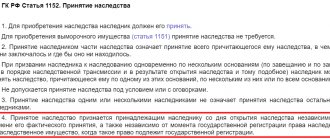Inheritance queues
In order to understand which relatives belong to which order, let’s look at an example. Citizen L. Died without leaving a will, which means the property is inherited by law. The citizen is survived by his daughter and wife, his father died long ago, his mother is still alive and also has inheritance rights. First of all, they represent the wife of citizen L.
, his daughter, wife and mother. They will receive the property divided into equal shares. However, the father of the deceased has a son from his first marriage, who is the testator’s half-brother. It belongs to the 2nd stage. If one of the heirs of the 1st stage refuses the inheritance in favor of this person, he will receive a share of the property.
The third line would include the uncle or aunt of citizen L.
By right of representation, only the descendants of the first three orders of heirs receive the inheritance.
The remaining queues, except for the seventh and eighth, are formed according to the same principle as the first three. The seventh stage includes stepchildren: if citizen L. had married a woman who had children from his first marriage, they would have laid claim to the property of the deceased in the order of the 7th stage. This also includes the stepmother and stepfather.
The eighth priority is the state: if the deceased had no relatives, his property becomes the property of the Russian Federation.
There are also compulsory heirs: they receive part of the testator's wealth, even if a will has been drawn up. Their shares are determined by law. Such heirs include minor children (not emancipated), first-degree relatives who are unable to work due to age or disability.
Any heir can challenge the right to inheritance, regardless of his or her priority. Situations often occur when the heirs of the second circle of priority do not inform other heirs about the death of the testator in order to avoid competition. Also, the cause of disputes can be legal illiteracy, in the case when relatives are involved in the division of property that should not belong to them.
The Civil Code of the Russian Federation records representatives of all seven orders of kinship. There are also applicants who can receive valuables by right of representation. The use of the institution of inheritance by law is necessary in the absence of a will of the deceased citizen. Also, if the will is declared invalid or has been appealed in court, then the distribution of material benefits will occur among citizens in the order of legal priority.
When opening inheritance proceedings, the notary must establish whether there are first-level relatives between whom values can be divided. If there are none or they are:
- found unworthy;
- abandoned their values;
- did not contact the notary with an application to open the inheritance within the prescribed period.
Then the entire amount of valuables goes to second-level relatives. If there is at least one representative of the first priority, then no one else can lay claim to the property.
Before covering the issue of second-order heirs under the law of the Civil Code of the Russian Federation, we should touch upon the topic of the inheritance process itself. This process is carried out on one of the grounds - by law or by will.
Legal inheritance occurs if the deceased did not express his will by will while alive, as well as in other circumstances provided for by law (for example, when one of the relatives is deprived of the opportunity to inherit).
Inherited property includes personal belongings, real estate, valuable property, as well as various kinds of rights and obligations, such as debt obligations.
You cannot inherit the obligation to pay alimony or compensate for damage caused.
If the death of a citizen is not reliably known, then the heirs have the right to assume their rights only 6 months after the court makes a decision to recognize the testator as dead.
The recipient of the property of the deceased of any order has the right to challenge the inheritance. Situations cannot be ruled out when second-order heirs deliberately keep silent about the death of the deceased to other successors, thereby violating their rights. Also, controversial situations arise due to legal illiteracy, when family members try to divide what does not belong to them.
However, to confirm the intentional actions of relatives, they will have to provide relevant documentary evidence.
Unfortunately, it is extremely rare to reach a peaceful agreement with an unscrupulous relative. Since the inheritance process is one of the most complex in legal practice, the best solution when difficult situations arise that require challenging the right of inheritance from relatives and friends of any kind is to contact qualified lawyers.
Only a specialist can competently understand the circumstances of the case, understand the documentation and successfully represent the interests of the applicant in court.
When does the right of second priority come into force?
Representatives of this stage are called upon to inherit only if the primary heirs did not accept the property of the deceased for the following reasons:
- are absent or have died before the person whose property is planned to be divided;
- did not apply to the notary to accept the inheritance within the period established by law;
- officially renounced their inheritance claims;
- they are unworthy and disqualified (deprived of the right to inherit by a court decision).
Who is included in the group of heirs of the 2nd stage according to the law in 2020
Today, the list of persons inheriting property in the absence of heirs of the first group or their refusal of their part includes:
- sisters and brothers;
- grandparents.
At the same time, the law defines the role of so-called half-sisters and brothers.
ASKING A LAWYER IS FASTER THAN READING! GET A FREE CONSULTATION WHILE OTHERS PAY FOR IT!
Half-blooded are those sisters and brothers who have one common parent (it doesn’t matter, mother or father). Conventionally, these citizens can be divided into two separate groups:
- uterine - having one mother;
- half-blooded - having a common father.
Stepsisters and brothers do not have a “full” blood connection, which means that in any case (even if the parents were in an officially registered marriage), they do not have the right to claim inheritance as the second line of heirs.
If there is more than one heir of the second stage, then the entire inheritance will be divided among all claimants to it in equal parts.
If the heirs cannot peacefully agree on the size of the parts of the property, then after receiving the certificate of inheritance, they are obliged to draw up a written agreement on the actual redistribution of the property. At the same time, you don’t even have to have this document certified by a notary office.
This agreement must specify a different procedure for using the property. It is worth noting that when dividing an indivisible inherited property, the heir who used it before the death of the testator has a great advantage in receiving it.
Also, we note that concluding such an agreement on the actual division of real estate before receiving a certificate of inheritance from a notary is considered illegal. However, this rule does not apply to movable things included in the inheritance.
According to existing legislation, the heir, when presenting a statement to the notary expressing his desire to receive the inheritance, is obliged to confirm his family relationship with the testator.
Usually, to do this, it is enough to present a standard set of documents. If there are not enough papers or they are missing, lawyers recommend urgently restoring the documents or obtaining a similar extract from the registry office.
The grandchildren of the testator have the right to receive part of the property only by right of representation, because, according to inheritance by law, they are relatives on the descending “ladder” of the legal heirs of the first priority.
Moreover, if the testator’s children were deprived of the right to inherit property, then their descendants (grandchildren of the testator) also do not have the right to receive property. Descendants who received part of the inheritance will in the future be liable for the obligations of the testator himself, and not for the debts of the deceased parents.
As you can see, heirs of the second priority according to the law acquire the right to receive their part of the inheritance only in the absence or
heirs of the first stage. I hope that now you understand how the inheritance is divided in this case. If you have any questions, we will be happy to answer them in the comments or using the “Question to a lawyer” form.
If you find an error, please highlight a piece of text and press Ctrl Enter.
SAVE TIME and MONEY! GET FREE CONSULTATION from the BEST LAWYERS while others pay for it!
The heirs of the first two stages are citizens who can claim the property of the deceased in the first place.
Heirs by law are called upon to inherit in the order of priority provided for in Articles 1142 – 1145 and 1148 of this Code (Clause 1 of Article 1141 of the Civil Code of the Russian Federation).
These are family members recognized as the testator's closest relatives by law. Their right to property cannot be challenged by other heirs.
Second priority: rights of heirs
The law establishes that the inheritance mass is not divided between lines, but goes to the heirs of one line in equal shares (Clause 2 of Article 1141 of the Civil Code of the Russian Federation). This means that a grandmother/grandfather or brother/sister will receive property only if the deceased does not have children, a spouse or parents, or all of them have issued a waiver of inheritance.
Also in civil law there is the institution of the right of representation. This means that when the legal heir cannot exercise his rights to receive material goods, then representatives take ownership of the valuables instead. This is only possible if the potential heir has died or has been declared missing or deceased in court.
Thus, the second line of inheritance includes the following successors:
- children of sisters and brothers (that is, nephews).
The only right of second-order heirs, which is exercised at the stage of opening inheritance proceedings, is the opportunity to submit an application for opening an inheritance. The notary is obliged to accept the application even if relatives of the second level of kinship cannot receive property in a particular case.
Along with other candidates for property, candidates must pay a state fee, as well as pay for notary services.
When inheriting property by law, heirs of any order must document the fact of relationship with the deceased. It is easier for heirs of the 1st and 2nd stages to do this, since less paperwork is required: birth certificates, passport details. If documents are lost, they can be easily restored through the registry office: all vital records are stored in the registry office for several years.
In a situation where restoration of papers is impossible, the heirs have the right to go to court. The main evidence will be witness statements, extracts from house books, correspondence of relatives, joint photos. With the court's decision on the case, the heir goes to the notary and receives papers for the property.
You have exactly six months from the date of death of the testator in order to receive the inheritance. If the deadline expires, you are automatically included in the inheritance. However, if this unpleasant situation was the result of a long illness or business trip, the court may reinstate the term.
In order to clearly determine who the second-order heirs are according to the law, it is necessary to clearly know the hereditary hierarchy.
The order of inheritance is as follows:
- First line. Sons, daughters, husband or wife, mom, dad.
- Second line. Brothers and sisters, grandparents on both lines of kinship. Brothers and sisters are only half-blooded or half-brothers; half-brothers are not considered relatives.
- Third line. Uncles and aunts.
- Fourth line. Great-grandparents.
- Fifth line. Great-grandparents and great-nephews and nieces.
- Sixth line. Cousins, uncles and aunts, nephews and great-grandchildren.
- Seventh line. Stepfather and stepmother, stepsons and stepdaughters.
But the order may change somewhat if there are no relatives of the corresponding line, but there are their representatives. This procedure is called the right of representation. It is not difficult to decide on representatives; these are the closest relatives, namely children, who are legally on the waiting list.
The second line of heirs has legal representatives of the following order - in the absence of living brothers and sisters, nephews and nieces of the deceased can claim a share in the inheritance.
Right of representation
Heirs by right of representation are subject to a special clause. This is also the second line of inheritance, we will deal with it separately.
If the brothers and sisters of the owner of the property are called to the inheritance division, and one of them died before him or on the same day, then the share of the deceased heir is transferred to his descendants, that is, to the nephews and nieces of the testator. Simply put, in such cases, by the right of representation for deceased parents, their children receive the property due to them.
Division of inheritance between heirs
Inheritance by right of representation, like inheritance directly, is subject to division among all legitimate claimants. After all applicants have submitted applications for their part, the notary must divide the remaining property between them. It is noteworthy that the values are divided between those who declared themselves, and not hypothetical heirs. In addition, the following may be removed from the list of applicants:
- Those convicted of illegal actions against the testator and who committed illegal actions against him during his lifetime.
- Those who voluntarily gave up their part of the property.
If the recipient is deprived of his share due to the discovery of illegal actions, then his share is divided evenly among all others. The same procedure will apply if one of the heirs renounces his part, without indicating in whose favor he is doing this. But you can also write a refusal with a clear indication of who will be the recipient of the refused share. In this case, it purposefully passes into the possession of the specified person.
Can property be divided into unequal shares among second-line claimants? The answer is clear - according to the law, no, but such a possibility exists in the event of a deliberate refusal in favor of another person.
There are two ways to divide an inheritance:
- Forcibly, when the division is carried out by a notary or a court.
- On a voluntary basis, when the heirs themselves agree on how to divide what they receive and secure the agreement with a peace agreement.
It is very difficult to divide equally what is expressed not in monetary amounts, but in kind. If there are several applicants, the property is divided into equal shares among all. However, relatives can agree among themselves that, for example, this property goes entirely to one, and the other completely to the second, then they will not have to sell all the property and divide the money received.
Whether the second-priority heirs will receive the property according to the law and how the inheritance is divided depends on many circumstances. It is customary to distinguish between several ways of distributing material assets between candidates for inheritance. The main ones include:
- drawing up a voluntary agreement between the participants on the distribution of property (in what shares each applicant will own the inheritance, the parties determine independently);
- equal division of property between representatives of the queue;
- awarding different shares of the inheritance to candidates.
Different parts can be registered as the property of heirs under the following circumstances:
- the need to allocate a mandatory share;
- the presence of receivers who receive values on the basis of hereditary transmission;
- separation of the marital share from the common property.
Example
Citizen K., who did not leave behind a testamentary letter with the procedure for disposing of personal property, died in the accident. Therefore, the notary decided to distribute material benefits among representatives of the legal queue. A private house with a total cost of 2,100,000 rubles has been offered for inheritance.
Citizen K. has no close relatives left. The parents died long before the death of the testator and K. was never officially married and has no children.
Considering that there are no representatives of the first stage, the property passes to the heirs of the second level of kinship. Among these are not a full brother - the son of a stepfather from his first marriage, and a grandfather. Previously, the deceased K. had a sister who also died in the accident, leaving behind two daughters.
Thus, the values will be divided in the following way:
- the grandfather will receive ownership of a part of the house equal in value to 700,000 rubles;
- a half-brother obtains ownership of 1/3 of the property with a total value of 700 thousand;
- the daughters of the deceased sister will become the owners of the remaining third of the house, but 50% each, that is, each daughter will take ownership of a share of the house worth 350,000 rubles.
The inheritance can go to the relatives of the deceased testator both according to the will and legally in the order of priority. However, it is worth considering that there is a category of persons who have the right to an obligatory part of the inheritance. It is presented:
- minor or disabled children of the testator;
- parents;
- a spouse who is dependent on the testator;
- other dependents.
According to the law, a minimum portion of compulsory inherited property has been established, which cannot be changed. It represents half of the income that would have passed to the heirs by law. This part of the property is deducted from the still undistributed inheritance or alienated from other recipients of the property, and their consent to the procedure is not required.
Based on the Civil Code, heirs of the second circle of priority also receive the above-described advantage when receiving an inheritance, but only if they are dependent on the testator.
Who are the second-priority heirs?
Let's consider who the primary legal successors are if there is no will - these are spouses, parents, children. The second line included the sisters and brothers of the deceased, as well as his grandfather and grandmother, if they were still alive. By right of representation, legal successors may be their relatives. Submission is a targeted refusal in favor of a specific person (including those from the second queue).
Consanguinity as the main condition
Blood relatives have no more rights than those who are classified as such on the basis of legal relations. The right to inheritance after the death of the owner of material wealth arises from the current spouse, whose marriage has not been dissolved at the time of opening of the inheritance. The laws work in a similar way in relation to adopted children, adoptive parents, as well as their descendants and relatives who are called by the right of transmission.
Full-blooded and half-blooded relatives
It is necessary to distinguish between situations when both legal parents of a child are blood. Often a brother and sister carry the DNA of only one of them, while the other half has unrelated genetics. But both of them are considered heirs of the first priority if the adopted child is officially adopted. Moreover, both of them are considered second-line heirs if their common biological parent dies.
Full and half-blood relatives
A special category of heirs are uncles, aunts and cousins. In this case, the blood connection is expressed by intersections at a more distant level than in the case of, for example, siblings. They also participate in accepting the inheritance, but they receive shares in the inheritance only if the applicants from the second priority refused or died before the testator. The will of the deceased may also imply granting them rights to own property on a general basis.
Half-blooded and half-brothers and sisters: the essence of the concept
To understand the difference between these legal terms, you need to remember the following. Representatives of the queue are children who have a common mother, but were born from different fathers. These are uterine. And half-bloods are considered to be brothers and sisters who have the same father, but different mothers. However, there are differences, the first is that both become legal successors if adoption takes place. Secondly, the queue will not affect persons who do not have an officially registered family affiliation.
Step-siblings and cousins
Neither one nor the other are heirs of the first stage. The second one too. Only if their representatives refuse and die before the opening of the inheritance will their turn come. When real estate is inherited, there is no tax as such, but the duty will double. If direct successors by kinship pay 0.3% of the price of the transaction object, then at the time of filing an application for accession, half-brothers/sisters will have to transfer 0.6%.
USEFUL INFORMATION: Land share as an inheritance
When there is no heir from the first stage, they become heirs of the second stage along with their brothers and sisters. A special case is the elderly who are unable to work and who were dependent on the testator. Then they are classified as obligatory legal successors. If they are indicated in the will, this fact is fundamental in the distribution of the inheritance. It is also possible to renounce in favor of a grandmother or grandfather, which, by right of representation, allows the use of the property.
How to enter into an inheritance?
Whether a second-stage heir can claim a share in the inheritance is decided by the notary, referring to the provisions of the civil law of the Russian Federation. In order to claim your rights to inheritance, you must complete the following steps:
- establish a notary office whose jurisdiction extends to the area where the deceased citizen is registered;
- submitting an application to a notary to open an inheritance;
- provision of a full package of documents confirming the presence or absence of other legitimate applicants for material assets;
- waiting for the expiration of the six-month period allotted for making claims to the inheritance.
The notary prepares a resolution on the possibility of entering into inheritance rights to material assets, after which you can begin to register ownership rights to the objects.
Is it necessary to prove kinship to second-order heirs?
Relatives and close people are recognized as legal heirs, and the order of inheritance is determined by the Civil Code (Articles 1141-1151). In total, there are 8 queues in the Russian Federation.
Heirs of the second priority by law are two clear categories of persons defined by law who have the right to receive the property of the deceased after its primary recipients. The heirs of the second stage include the following categories of persons:
- older relatives, namely grandparents on any of the parental lines;
- blood (father) or half (mother) sisters and brothers of the deceased.
If we talk about the first group of people, then there are no questions about the legality of the grounds for receiving an inheritance from maternal relatives.
If relatives on the side of the deceased’s father claim the inheritance, if disputes arise between the heirs, paternity must be proven in court.
The situation is especially difficult with those born out of wedlock or who do not have a record of paternity on the birth certificate.
The second group of persons (brothers and sisters) were not previously included in the list of successors, but after the Second World War their right to be present in the second line was stated in Article 1143 of the Civil Code of the Russian Federation.
Article 1143 of the Civil Code of the Russian Federation with comments describes the reasons for establishing these principles. According to the legislator, a different state of affairs would deprive all sense of determining the order of successors and would make it difficult to protect the interests of close relatives of the deceased.
Who is the second-order heir by law?
According to Art. 1143 of the Civil Code of the Russian Federation, the following relatives of the testator are the heirs of the second priority by law:
- brothers and sisters;
- grandfather and grandmother, regardless of the side of their relationship (mother's or father's side).
There must be a blood connection between the deceased person and his successor. Among the second-priority applicants for inherited property may be brothers and sisters who have both parents or only one of them.
Reference. Consanguineous relatives are persons descended from the same father, and half-uterine relatives are brothers and sisters born from the same mother.
To receive a share in the property, grandparents must be related by blood to the grandchildren whose inheritance they are claiming.
Which of the second-priority successors cannot be called to inheritance?
The legislation did not include cousins and brothers in the list of secondary legal successors. They can become recipients of an inheritance by right of representation if the notary has called third-rank citizens to receive the property.
Note. Art. 1146 “Inheritance by right of representation” of the Civil Code of the Russian Federation states: if the legal recipient died at the same time as the testator or after the day the inheritance was opened, his share may pass to nephews, grandchildren or persons who were cousins with the deceased.
Previously, in Art. 532 “Heirs by law” of the Civil Code of the RSFSR, cousins were not at all invited to receive the inheritance upon its transfer without a posthumous order. The above changes came into effect on May 17, 2001.
Persons in a step relationship, that is, if there are no common parents, do not have the authority to inherit.
Challenging the right of inheritance of the second priority
Heirs of the second priority, claiming property without a will, as well as other potential candidates for material wealth, can initiate the procedure for annulment of the notary's decree and restoration of the terms for consideration of inheritance proceedings. Such disputes are resolved exclusively in court. And those persons who believe that their rights have been limited or violated can send a claim to the court office.
All disputes related to the entry into inheritance rights can be divided into the following groups:
- identification of fraudulent actions on the part of heirs who received material benefits without having the right to do so (if the court proves that the recipient of the inheritance deliberately submitted false documents in order to become the owner of the property, then his rights to the property will be canceled and the question of the possibility of criminal prosecution will be raised responsibility);
- establishing that the testator left behind a will (for example, if the document was drawn up in emergency circumstances and was not approved by a notary);
- missing legal deadlines.
Restoring missed deadlines is quite common. This happens when only a few years later a relative becomes aware that his loved one has died and the inheritance has already been successfully divided between claimants for the valuables. In this case, it is necessary to confirm that the plaintiff really did not know about the death of the relative. As practice shows, such claims are extremely rarely satisfied.
The second option is the birth of a child who is also an heir, but at the time of distribution of the inheritance he has not yet been born. The baby's mother files a claim to review the division of property between the claimants. 80% of such requests are granted by judges.
The procedure and its cost
The order of inheritance is determined by the legislative framework and is described in Articles No. 1141-1145 of the Civil Code of the Russian Federation. Relatives from each subsequent circle of succession become heirs, but only if there are no previous recipients of property or they have lost inheritance rights.
Children of half-brothers and sisters of the testator will receive inherited rights to the property of the deceased if their parents died on the same day as him or before the moment when the inheritance is opened. This right is called the right of representation.
If there are several second-order heirs, then the testator’s property will be divided between them in equal parts. However, the presence of property recipients who have the right to an obligatory part of the inheritance and those who have the right of representation is also taken into account. If controversial situations arise, after receiving a certificate of inheritance rights, it is necessary to conclude an agreement regarding the division of property in a notary's office.
To ensure that inheritance passes without incident, preparations are made for the procedure in advance. In this case, the preparation is presented:
- Collecting the necessary package of documents.
- By contacting a notary office to confirm the absence of a testamentary act.
- By contacting a lawyer or notary to carry out the procedure correctly.
Important! To obtain rights to inherited property, you should contact a notary office within the established time frame and
to write an application
, in which consent will be expressed to receive the property due to him.
The services of a specialist will cost 0.3% of the inheritance amount. However, the amount cannot exceed 100,000 rubles. Other services that may be needed in the process of registering inheritance rights are paid according to a different tariff.
The procedure for obtaining rights to property can be considered completed only when they are transferred from the deceased testator to the heir. Often, residential real estate acts as an inheritance, which should be re-registered in Rosreestr. You should come to this organization with a certificate of inheritance in hand, which will become the basis for issuing to the heir a document on his ownership rights to housing.
The order of inheritance is determined by the Legislator and is described in Articles 1141-1145 of the Civil Code of the Russian Federation. Recipients of the property of the deceased become relatives from each subsequent line, if the previous heirs are absent, or they were deprived of their privileges or excluded from the inheritance.
The heirs of the second circle of priority can accept the property of the deceased in the event that the first-priority heirs refused the inheritance or did not accept it in due time.
Children of blood and half-sisters or brothers of the testator receive the right to inherit all the property of the deceased if their parents died on the same day with him or before the opening of the inheritance (right of representation).
If there are several relatives of the second circle of priority, then all the property of the testator is distributed among them in equal shares. This takes into account the presence of heirs by right of representation and those who should receive the obligatory share.
In a situation where disputes arise in a family about the distribution of property, after receiving a certificate of inheritance, they have to enter into an agreement on the division of property.
This document does not have to be certified by a notary; it can define a different procedure for using the property, different from that specified in the certificate. In this case, the person who used it before the distribution of the inheritance has more rights to indivisible property.
It should be borne in mind that dividing property by agreement before the death of a relative or before entering into inheritance rights is prohibited. This prohibition applies only to the real estate and property rights of the deceased.
Inherited property can go to the relatives of the deceased both by will and by law, in order of priority. However, there always remains a mandatory part, which is allocated to the circle of people who are entitled to it.
This category includes:
- children of the deceased (including adopted children), who have not reached the age of majority or have been declared disabled;
- parents (including step-parents who have registered the adoption of an heir);
- spouses who are legally dependent on the testator;
- other dependents.
The legislation also regulates the size of the minimum share of the obligatory inheritance, which neither legal offices nor judicial authorities can change.
How does this apply to relatives of the deceased in the second circle of succession? According to the law of the Civil Code of the Russian Federation, heirs of the 2nd stage also receive this advantage in the order of inheritance, but only if they were dependents of the testator.
Let's consider how heirs of the second stage enter into inheritance.
You should prepare for the inheritance procedure in advance. To do this, you need to perform several steps:
- Collect all required documentation (death certificate, documents on family ties with the deceased).
- Contact any notary to ensure that there is no will or bank testamentary disposition.
- Find a specialist who can competently carry out the inheritance procedure.
To carry out the procedure itself, it is enough to pay a visit to a law office chosen in advance by the deadline established by law, and fill out an application expressing the desire of the heir to receive the capital due to him.
The company’s services in this case cost 0.3% of the amount of inherited property, but not more than 100 thousand rubles.
This is exactly how much the state fee costs for issuing a certificate of inheritance. Other services that may arise during possible proceedings or controversial situations are paid at separate rates.
The inheritance procedure can be read as completed from the moment when the ownership of property is transferred from the deceased person to the heir.
Most often in such situations you have to deal with real estate, for the re-registration of which you need to appear at Rosreestr with an already received certificate of inheritance. This document is the basis for issuing to the successor a certificate of ownership of the inherited residential premises or plot of land.
Heirs of the second line without a will accept the received property values in the same manner as the representatives of the first line.
To do this they need:
- Collect documentary evidence that allows you to claim property values. The papers must certify the death of the testator, the identity of the recipient, indicate direct relationship and prove the relationship to the 2nd stage. In addition, you will need a list of the property itself and documents for it, which will prove that the real estate, car or other valuables really belonged to the deceased.
- Write an application presenting claims to receive the due portion.
- Wait for the due date so that other heirs of the second stage can submit applications.
- Having decided on the shares in a legal notarial manner or in court, obtain a certificate of inheritance.
- Re-register the property in your name in the prescribed manner, and then dispose of it at your own discretion.
The procedure is always standard, regardless of the order in which the property is received.
Who can count on the obligatory share?
In order to take care of the maintenance and well-being of certain groups of the population, the state provides special provisions for their inheritance of property (Article 1149 of the Civil Code of the Russian Federation).
USEFUL INFORMATION: Civil law on inheritance: basic information
There is a list of mandatory heirs:
children under 18 years of age or disabled (including adopted children). A spouse who is unable to provide for himself and was dependent on the testator during his lifetime. Parents of the deceased (including if they adopted him). Dependents (people who, due to certain circumstances, cannot earn a living, lived with the deceased, and it does not matter whether they are relatives).
The listed persons are entitled to a part of the inheritance, regardless of whether there was a will or not.
Also, objections of relatives in disputes over property rights are not accepted by these persons. They must be provided with an inheritance in any case. Their share should be at least half of what they could have received without a will (Article 1148 of the Civil Code of the Russian Federation).
Moreover, when inheriting living space (or any real or movable property), if a person had the right to own it during the life of the testator, this right is retained by him. And the inherited share does not become smaller because of this. The heir can accept the property on all grounds, on several or one of them in accordance with his desire.
At the same time, another heir under the will used this property: he permanently lived in it or used it as the main source of income. Then the obligatory heir, taking into account his financial capabilities, may be deprived of the rights to his share (or part thereof).
Important! There are cases when a person inherits property (or a part of it) through compulsory share, which he did not use until that moment or did not even know about its existence.
We talked in more detail about who has the right to inheritance by law and will, and here you will learn about the peculiarities of the procedure for dividing property in such cases.
Responsibilities for debts and responsibility for accepted inheritance
Inheritance is not always represented only by values. Often, along with material goods, debt obligations are included. The distribution of financial obligations can occur as follows:
- equal distribution among all heirs;
- entrustment only to those candidates who receive property encumbered with monetary debts and loans.
If the heir has become the owner of an apartment that is under a mortgage or has received the obligation to repay a separate consumer loan, then after assuming the rights of inheritance, the citizen must inform the creditor about this. The borrower draws up a new agreement, which states that further payments fall on the shoulders of the newly-minted heir.
In case of late payments or evasion of their execution, the heir will be subject to sanctions provided for in the contract. Therefore, you need to be prepared to strictly comply with the signed contract.







